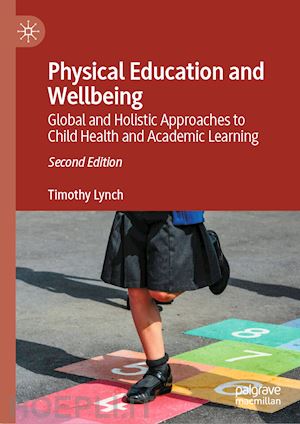
Questo prodotto usufruisce delle SPEDIZIONI GRATIS
selezionando l'opzione Corriere Veloce in fase di ordine.
Pagabile anche con Carta della cultura giovani e del merito, 18App Bonus Cultura e Carta del Docente
This book, now in its second edition, explores how physical education (PE) and learning through movement can be best enacted in schools in order to optimise children's wellbeing and subsequent academic learning. Drawing together extensive data from school communities around the globe, the author examines multiple dimensions of child health in practice. Ultimately, the findings suggest that PE is imperative within the wider landscape of children’s holistic learning, offering a powerful platform for meaningful connections across learning areas. While quantitative research has long evidenced the benefits of physical activity, this book contributes to the complex and global issue of what effective health and wellbeing approaches look like in practice, offering clear strategies for optimising children’s academic learning. It is natural for children to enjoy movement for the purposes of play, exploration, learning and development; this book is essential reading for scholars (professors, researchers and students), school leaders and educators looking to enhance children’s wellbeing, general health and academic learning.
Chapter 1: Introduction.- Chapter 2: Theories, Models and Approaches: Physical Education and Wellbeing.- Chapter 3: Approaches to Health and Wellbeing.- Chapter 4: Global Policy: Holistic Health, Wellbeing and Physical Education.- Chapter 5: The Meaning of ‘Education’ in ‘Physical Education’.- Chapter 6: ‘Physically’ Educated for Student Wellbeing.- Chapter 7: History of the Physical Dimension.- Chapter 8: Contemporary Problems in School Communities: Exploring the Power of Educational Approaches in Health, Wellbeing and Physical Education.- Chapter 9: The Power of Lifelong Wellbeing for Academic Learning: The Singapore Model.- Chapter 10: Wellbeing Enactment in Schools: Implementing Learning Values.- Chapter 11: The Sociocultural Approach, Whole School Approach and Implementing in Schools.- Chapter 12: Methodology: Research Design and Analysis of Data.- Chapter 13: Spiritual Dimension.- Chapter 14: Mental Health: Social and Emotional Dimensions.- Chapter 15: Physical Dimension.- Chapter 16: Cognitive Dimension.- Chapter 17: Conclusion and Recommendations.
Timothy Lynch is employed as the Western Co-Head of ECE (Early Childhood Education) and Primary at Yew Chung International School of Chongqing, China.











Il sito utilizza cookie ed altri strumenti di tracciamento che raccolgono informazioni dal dispositivo dell’utente. Oltre ai cookie tecnici ed analitici aggregati, strettamente necessari per il funzionamento di questo sito web, previo consenso dell’utente possono essere installati cookie di profilazione e marketing e cookie dei social media. Cliccando su “Accetto tutti i cookie” saranno attivate tutte le categorie di cookie. Per accettare solo deterninate categorie di cookie, cliccare invece su “Impostazioni cookie”. Chiudendo il banner o continuando a navigare saranno installati solo cookie tecnici. Per maggiori dettagli, consultare la Cookie Policy.